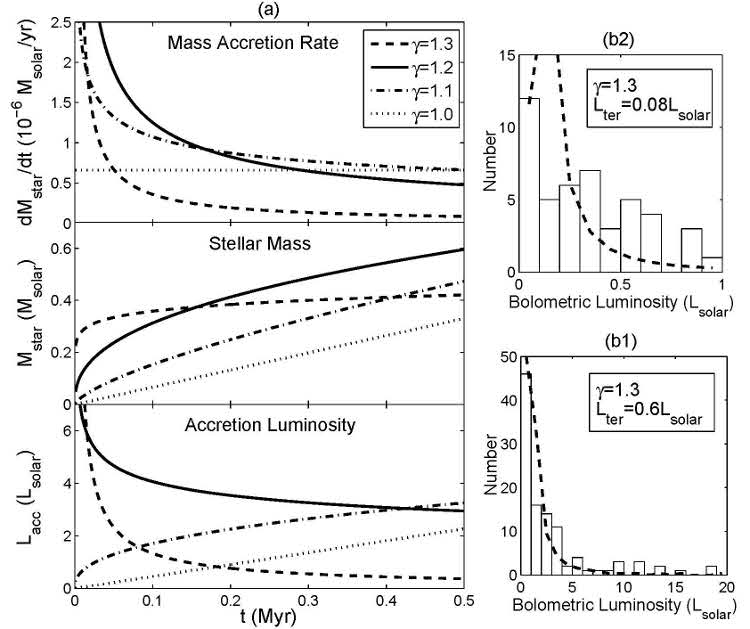| EPoS Contribution |
|
On protostellar mass accretion rate in star formation
Yang Gao Tsinghua U, Beijing, CN | |
| Spherical hydrodynamic models with polytropic equation of states for star formation are revisited, in the context of the so called luminosity problem in observations. It is noticed that if the star-forming cloud is described by a polytropic sphere with a polytropic index γ > 1, the protostellar mass accretion rate decreases as the star forms, which is a possible solution to the luminosity problem. In view of observations of radial density profiles in a large portion of molecular clouds that are evolving toward protostars, polytropic sphere models with greater than unity polytropic indices are also preferred. Additionally, the Larson's σ - L relation for star-forming clouds are also explained in polytropic sphere models, as a scaling effect of systematic motions, which is an alternative to its turbulence origin. | |
 | |
| Caption: Evolution of protostellar mass accretion rates, protostellar masses and accretion luminosities in different polytropic spheres for star formation (a); and number of protostars with envelopes distributed in luminosity bins (b1), (b2): theoretical fittings (dash lines) to c2d observations (Evans et al. 2009). For all γ > 1 polytropic spheres, mass accretion rates decrease [(a), upper panel], and protostars accumulate most of their masses in the early days of the star formation [(a), middle panel]. We may also notice in the bottom panel of (a) that only for larger values of polytropic indices (γ = 1.2, 1.3) do accretion luminosites decrease. Both the number distribution in luminosity bins ranging 1 Lsolar - 20 Lsolar and a detailed distribution between 0.1 Lsolar - 1 Lsolar are shown in (b1) and (b2). Theoretical fittings are adopted based on the γ = 1.3 polytropic sphere model, by assuming that the bolometric luminosity is equal to the accretion luminosity, and by adopting proper luminosities for terminations of protostellar accretions. | |
| Collaborators: Y.-Q. Lou, Tsinghua U, China |
Suggested Session:
Cores |

